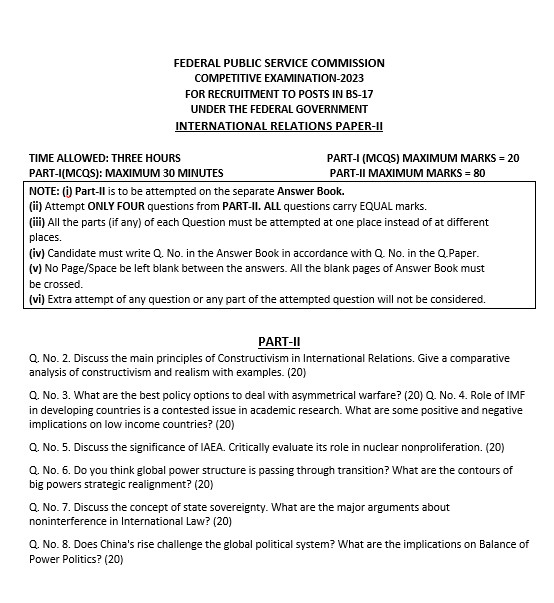CSS International Relations 2023 paper(a)
No. 2. Discuss the main principles of Constructivism in International Relations. Give a comparative analysis of constructivism and realism with examples. (20)
No. 3. What are the best policy options to deal with asymmetrical warfare? (20) Q. No. 4. Role of IMF in developing countries is a contested issue in academic research. What are some positive and negative implications on low-income countries? (20)
No. 5. Discuss the significance of IAEA. Critically evaluate its role in nuclear nonproliferation. (20)
No. 6. Do you think the global power structure is passing through a transition? What are the contours of big powers’ strategic realignment? (20)
No. 7. Discuss the concept of state sovereignty. What are the major arguments about noninterference in International Law? (20)
No. 8. Does China’s rise challenge the global political system? What are the implications of Balance of Power Politics? (20)
Summary of Questions:
No. 2. Discuss the main principles of Constructivism in International Relations. Give a comparative analysis of Constructivism and Realism with examples.
Constructivism emphasizes that international relations are shaped by ideas, norms, and identities rather than just material power. Unlike Realism, which prioritizes state power and survival, Constructivism focuses on how social constructs influence state behavior. For example, NATO’s cohesion reflects shared values (Constructivism), while its expansion concerns Russia’s security interests (Realism).
No. 3. What are the best policy options to deal with asymmetrical warfare?
Effective policies to counter asymmetrical warfare include enhancing intelligence, strengthening cybersecurity, using precision-strike capabilities, fostering counter-insurgency strategies, and promoting community resilience. Non-military approaches like addressing root causes of grievances, economic development, and information campaigns are equally critical in undermining asymmetrical threats.
No. 4. Role of IMF in developing countries is a contested issue in academic research. What are some positive and negative implications on low-income countries?
The IMF provides financial assistance and policy guidance, helping stabilize economies during crises. However, its conditionalities often lead to austerity measures, reduced public spending, and increased debt dependency. While IMF programs can foster macroeconomic stability, they sometimes exacerbate inequality and social discontent in low-income countries.
No. 5. Discuss the significance of IAEA. Critically evaluate its role in nuclear nonproliferation.
The International Atomic Energy Agency (IAEA) ensures safe and peaceful use of nuclear energy, verifying compliance with treaties like the NPT. While it has succeeded in monitoring nuclear activities (e.g., Iran), its authority is often limited by political pressures and the lack of enforcement mechanisms, leading to criticism about its effectiveness.
No. 6. Do you think the global power structure is passing through a transition? What are the contours of big powers’ strategic realignment?
The global power structure is transitioning from US unipolar dominance to a multipolar order, with China and Russia asserting greater influence. Strategic realignments include US alliances in the Indo-Pacific, China-Russia cooperation, and regional coalitions like BRICS. This shift reflects economic interdependence and emerging power centers.
No. 7. Discuss the concept of state sovereignty. What are the major arguments about noninterference in International Law?
State sovereignty entails the authority of states to govern without external interference. Noninterference is a principle of international law that protects states from foreign intervention. Critics argue that sovereignty should not shield human rights abuses, while proponents stress its importance for maintaining global order and preventing hegemony.
No. 8. Does China’s rise challenge the global political system? What are the implications of Balance of Power Politics?
China’s rise challenges the existing global order by reshaping economic and political dynamics through initiatives like BRI and assertive foreign policies. Balance of Power Politics aims to counter this through alliances like the Quad. The resulting power competition increases tensions, particularly in the Indo-Pacific, influencing global stability.
